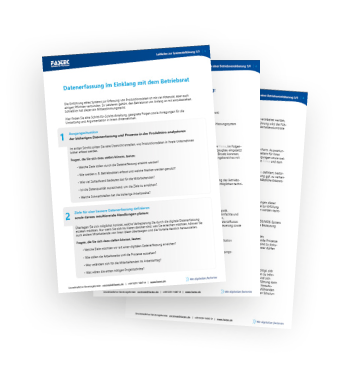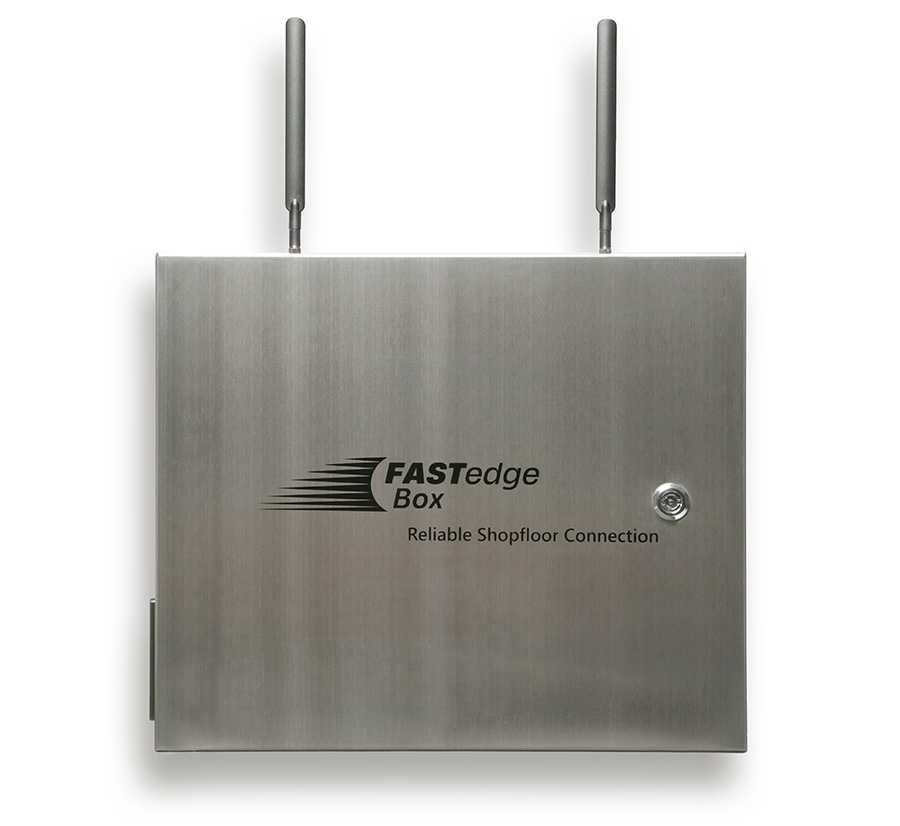With an MES, machine and production data (MDA/PDA) can be acquired digitally in a company for the purpose of optimizing production. What previously had to be recorded manually on paper and in Excel files can now be recorded automatically – saving time for employees, who can then focus on other important tasks. It becomes clear that the principle of data acquisition is not new, but is practiced in companies even without MES. This is the only way to collect important production data. However, software turns a gut feeling into clear facts. It automatically reports on factory productivity, reveals potential and thus enables performance to be improved. At the same time, employees benefit from a reduction in workload and modern processes and can actively use the tool during their work. Manual recording becomes automatic recording.
Cooperation with the Works Council Is Crucial When Introducing Software
The works council is an important body in an organization and must be involved in the decision on the collection of production data. It represents the interests of the employees and at the same time has certain tasks, rights and obligations as set out in the Works Constitution Act (BetrVG). Only through a close exchange misunderstandings and ambiguities about the project can be cleared up right from the start. According to § 80 BetrVG, the works council has supervisory, organizational, protective and supportive duties:
- It therefore monitors the implementation of laws, ordinances, accident prevention regulations and company agreements in the interests of employees.
- Protective tasks include the works council supporting the integration of severely disabled employees and other employees in need of protection, implementing measures for older people and promoting the integration of foreign employees.
- Organizational tasks include the works council taking up suggestions from employees and requesting and implementing measures from the employer.
- Supportive tasks include the implementation of gender equality, the promotion of work-life balance, the election of youth and trainee representatives (JAV) and the general promotion and safeguarding of employment in sales.
The works council also has a number of rights. A distinction is made here between those relating to the works council as a body and those relating to the individual members:
- For example, the committee has information rights: the works council must receive all information from the employer in order to carry out its work properly.
- Also important in connection with the introduction of an MES are the participation rights, according to which the employer must consult the works council and vice versa.
- The committee also has co-determination rights.
The works council must also fulfill certain obligations. These include the duty of confidentiality, which concerns company and business secrets as well as personnel matters. There is also an obligation to provide further training and general duties such as trusting cooperation with employers.
Do Employers Have to Inform the Works Council About the Use of Technical Systems?
With an MES such as FASTEC 4 PRO, production data is acquired. If requested by the company, a machine operator logs on to their machine at the start of their shift. It is then possible to track how long they have worked or how much they have produced during their shift. However, the software can also be used without personnel logging. In this case, the machine and production data is recorded without reference to employees.
Companies must always comply with the General Data Protection Regulation (DSGVO) and the Federal Data Protection Act (BDSG). The latter has defined three phases in which the works council can exercise its right of co-determination. This includes the collection phase, when data is collected about the behavior or performance of employees. Secondly, there is the processing phase, in which precisely this data is saved, organized and correlated for the purpose of the report. Finally, in the utilization phase, the data is evaluated.
Before introducing an MES, it is also important to note that a company must inform the works council comprehensively and well in advance about the use of technical systems in accordance with § 80 Para. 2 BetrVG. The latter is also able to involve an expert in the discussions about this. This usually occurs when the works council lacks important information about the project.
In addition, data may only be collected if it serves the purposes of the employment relationship in accordance with § 26 para. 1 BDSG. According to § 87 Para. 1 No. 6 BetrVG, the works council further has a right of co-determination here. It must ensure that the provisions of the DSGVO and the BDSG are complied with in the company in accordance with § 80 Para. 1 BetrVG.
Company Agreement on the Software Can Be a Solution
If there are still disagreements regarding the introduction of an MES or if both parties would prefer to set out their framework conditions in writing, a works agreement is a helpful instrument. This is a contract between the employer and the works council. Once this has been drawn up and signed, the stipulated regulations apply to the entire workforce. The advantage of a works agreement is that it creates clarity and both parties can always refer back to what has been set out in writing.
The content of the agreement is determined by higher-ranking law and the principles of works constitution law. For example, there is an objective. When introducing an MES, this defines exactly what the software will be used for: It is conceivable that it could be used to increase earnings, make savings, perform maintenance, optimize processes and derive improvement measures. A storage period stipulates that production data in personal form is only stored for as long as is necessary to fulfill the respective purpose. It can also be agreed that data may not be used to monitor the performance or behavior of employees without the consent of the works council.
How to Proceed if Employees and the Works Council Have Doubts?
If companies are introducing digital data acquisition for the first time and there is still little information about the planned measures and the purpose of the project, this can lead to uncertainty among the workforce. Our customer Heraeus Medical provides a helpful practical example. Here, too, there were some reservations at the beginning. The company closely coordinated the introduction of digital data acquisition with the works council. In order to allay possible fears among the workforce, it was necessary to communicate that personal monitoring is not possible with the underlying configuration of the system. The employees gained familiarity with the system by working with it on a daily basis and the line staff operating the system themselves. This gave them a feeling for what happens to the data. It also turned out to be positive to take employees’ wishes into account. As a result, Heraeus Medical has succeeded in getting employees to identify with the process.









